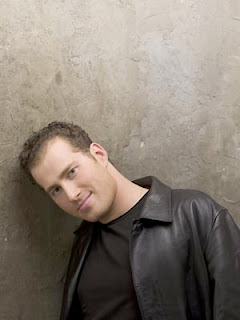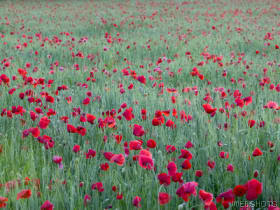"He makes it look so easy," grumbled the awe-struck fiddlers in the RFH artists' bar last night. And he did. There's no fuss about Nikolaj Znaider. Towering over the dusky Vladimir Jurowski, who is not short, he strode onto the platform and made the Korngold concerto look and sound...well, Znaider is one of only a handful of violinists who are, to put it bluntly, perfect. Not only is there never a note out of place, but while you listen you can't imagine the work sounding any other way: the logic, the phrasing, the tone are simply - perfection. In this category I'd include only Znaider, Kavakos, Tetzlaff and Repin.
...But what was that about tone? The Korngold Violin Concerto, as all of you assuredly know, opens with the soloist playing a wonderfully mellifluous and heart-twisting melody. My first thought, listening, was 'Wow, the acoustic really has improved in here'. Next thought: 'This bloke is fab.' And no.3: 'What is that thing he's playing anyway?' There was no undue effort about that playing; no forcing of sound, no histrionics, just complete focus and simplicity - hence he could 'make it look so easy'. That violin had to be something very, very special. From bottom G to the highest multiledgered stratospheres the tone soared, unencumbered, as powerful as a Steinway, honey-golden, Korngolden.
There's no point giving a lousy fiddler a multi-million-dollar Italian job to perform on because it won't improve him. The violin does not make the violinist; quite the opposite. Christian Tetzlaff, for instance, has a modern instrument that we hear costs only a modest five-figure sum, but in his hands it sounds like Stradivari's masterpiece [note - it is a very fine violin, it's just not an expensive Italian antique. It is by Peter Greiner and was made just a few years ago.].
Nevertheless, give a violinist like Znaider an instrument like the one he played yesterday - and time freezes while the music comes out. Yes, this instrument is special. It's [drumroll] Fritz Kreisler's Guarneri del Gesu, made in 1741 - the violin on which he gave the world premiere of Elgar's Concerto. And from it there seemed to stream all the wisdom and wonder of two and a half centuries, all the secrets of the instrument's creators, the performers who cherished it and the music it inspired... Goose-bumps? You should have been there. (but hey - you can be, thanks to the radio and the Internet.)
While we were being dazzled by Nikolaj and his magic violin, there was equal bedazzlement from the orchestra with Jurowski. He brought out the intricacies and subtleties of the textures, the flashes of glitter in the velvet, the imagination that's not only lavish and rich but studded with gem-like, fantastical detail. The tempi were spot-on - quick enough to fly, but airy enough to enjoy the luxury. Even the 'Korngolistas' were bowled over; we all felt we'd heard things in the concerto we'd never noticed before.
The rest of the concert involved Zemlinsky's Sinfonietta - in which one could tell how far his star pupil, young Herr EWK, had surpassed him - indeed, the aging Zemlinsky quotes from Korngold's Sinfonietta, written twenty years earlier. And to finish, a stunner of a Shostakovich Sixth.
Now please excuse me while I go and iron my party dress...
NB - You can hear the concert on BBC Radio 3 on Friday evening.
Thursday, November 15, 2007
Tuesday, November 13, 2007
Onwards! Korngold returns!

Thought it was all over? Ah no, it's just beginning. The Korngold festivities over here will be getting underway once more tomorrow, when Nikolaj Znaider (left) (isn't he lovely?) will be the soloist in the Violin Concerto, with the LPO conducted by Vladimir Jurowski. The programme also includes the Sinfonietta by Korngold's teacher, Zemlinsky, and Shostakovich's Symphony No.6 - an interesting choice, since Shostakovich wrote music for many more films than Korngold did and the final movement feels a tad redolent of the madcap silent movies of the era (even if it's not a direct borrowing). Details and tickets here.
Now it's full steam ahead. Korngold's granddaughter is flying in from the States, there'll be parties and celebrations, music and films, hugs and tears and cheers, female fans will be swooning at the feet of Nikolaj and Vladimir (joint first place in the musical-woman's-eye-candy contest), Heliane rehearsals begin on Friday, and I have got to get my voice back in time for my talk, preferably a lot sooner. Also I'm facing a new dilemma: what do you cook for a Korngold?
Meanwhile, huge thanks to everyone who joined the Foulds discussions.
Labels:
Korngold,
Korngold 2007
Sunday, November 11, 2007
Remembrance Sunday

It's 11 November. Here's a favourite poem by Lawrence Binyon
The Burning of the Leaves
Now is the time for the burning of the leaves.
They go to the fire; the nostril pricks with smoke
Wandering slowly into the weeping mist.
Brittle and blotched, ragged and rotten sheaves!
A flame seizes the smoldering ruin and bites
On stubborn stalks that crackle as they resist.
The last hollyhock's fallen tower is dust;
All the spices of June are a bitter reek,
All the extravagant riches spent and mean.
All burns! the reddest rose is a ghost;
Sparks whirl up, to expire in the mist: the wild
Fingers of fire are making corruption clean.
Now is the time for stripping the spirit bare,
Time for the burning of days ended and done,
Idle solace of things that have gone before:
Rootless hope and fruitless desire are there;
Let them go to the fire, with never a look behind.
That world that was ours is a world that is ours no more.
They will come again, the leaf and the flower, to arise
From squalor of rottenness into the old splendour,
And magical scents to a wondering memory bring;
The same glory, to shine upon different eyes.
Earth cares for her own ruins, naught for ours.
Nothing is certain, only the certain spring.
Labels:
poems
Friday, November 09, 2007
From the sublime to....
....I have received a E-Card from English National Opera, bearing the following message:
Try it here.
What an interesting idea. It must be at least 30 years since I last played with paper dolls. I shall spend the day colouring in, when I've finished my homework, then phone the box office and buy hundreds of tickets...
To be fair, Zandra Rhodes's designs are very nice and look suitably Egyptian. Fans can watch an interview with her here. But I can't help wondering who this redoubtable company thinks its audience is.
UPDATE (Monday): ...but this glowing review from The Independent should certainly shift some tickets even if the paper doll didn't.
ENO has sent you an Aida e-card in collaboration with top British fashion designer Zandra Rhodes. This exclusive e-card gives you the chance to explore Zandra's costumes from ENO's spectacular new production of Verdi's Aida though an interactive dress-up doll. Click onto the e-card to try styling your own outfits and then send it on to a friend to share the fun!
Flex your style muscles!
Choose from a selection of exotic costumes and vivid colours from this unique production to create your own outfit. Forward your stylish results on to a friend and they can have a go too!
Try it here.
What an interesting idea. It must be at least 30 years since I last played with paper dolls. I shall spend the day colouring in, when I've finished my homework, then phone the box office and buy hundreds of tickets...
To be fair, Zandra Rhodes's designs are very nice and look suitably Egyptian. Fans can watch an interview with her here. But I can't help wondering who this redoubtable company thinks its audience is.
UPDATE (Monday): ...but this glowing review from The Independent should certainly shift some tickets even if the paper doll didn't.
Wednesday, November 07, 2007
The genius of John Foulds
I have a piece in today's Independent about John Foulds (1880-1939), the extraordinary British composer whose biggest work, A World Requiem, is to be performed for the first time in 81 years at the Remembrance Sunday concert at the Royal Albert Hall this weekend. The work was premiered at the Remembrance Day Festival in 1923 and was given for the same event for four years running, with 1250 performers each time, before being unofficially 'banned'. Apparently Sir Adrian Boult thought it was boring and the editor of the Express thought Foulds was a communist.
Foulds spent his life in a radical exploration of music and spirituality: he experimented with quarter-tones before Bartok did and with Indian music techniques before Messiaen got to them. With his partner, the musician, educator and fellow Theosophist Maud MacCarthy, he moved to India in 1935, becoming head of western music for the country's national radio and seeking a way to make a synthesis of Indian and European music, decades before anyone thought of terms such as 'world music fusion' (see photo). He died of cholera four years later. Most of his manuscripts were subsequently lost or destroyed, rotting in the heat or being eaten by rats.
The concert is a live broadcast on BBC Radio 3 and you can listen to it on Sunday evening at 6.30pm local time. Be warned: there are 20 movements.
Labels:
John Foulds
Subscribe to:
Comments (Atom)